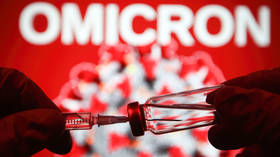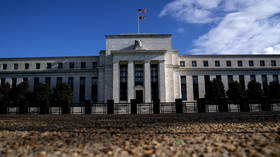Could Omicron save us from COVID?

Dr. Anthony Fauci, who is not known for a tendency to understate the risks of COVID-19, has said the Omicron variant may not be all that bad:
“Though it’s too early to really make any definitive statements about it, thus far it does not look like there’s a great degree of severity to it … Thus far, the signals are a bit encouraging.”
While Fauci also says the new variant’s mutations appear to have made it more capable of infecting people, that may not be a bad thing if it shows itself to be much less destructive. In fact, some studies and observations show it could prove to be what some would call a godsend.
That is because those who get the new strain could gain naturally enhanced immunity to all strains. While the mRNA vaccines only build immunological recognition of the spike protein that has become significantly mutated in Omicron, potentially rendering the vaccines less effective, contracting the Omicron variant may result in immunity that broadly recognizes many other aspects of the COVID virus (SARS-CoV-2) for which the mRNA vaccines do not program the body to be on alert.
Dr Angelique Coetzee, chairwoman of the South African Medical Association, criticized the West’s “extreme” response to her announcement of the new variant’s emergence in South Africa: “I have seen a lot over my medical career, but nothing has prepared me for the extraordinary global reaction that met my announcement … This version of the virus had been circulating in southern Africa for some time … Let me be clear: nothing I have seen about this new variant warrants the extreme action the UK government has taken in response to it. No one here in South Africa is known to have been hospitalized with the Omicron variant, nor is anyone here believed to have fallen seriously ill with it.”
Coetzee notes that all Omicron cases she has seen in South Africa have been mild. If South Africa’s experience with Omicron turns out to be typical, then the illness it delivers will be no worse than the flu, but the protection it delivers against more vile forms of COVID may prove to be as good as the immunity any form of COVID provides.
“If, as some evidence suggests, Omicron turns out to be a fast-spreading virus with mostly mild symptoms for the majority of the people who catch it, that would be a useful step on the road to herd immunity,” says Coetzee.
Dr. Houman Hemmati, a Ph.D. research scientist has even gone as far as to say that Omicron could actually bring on the end of the pandemic:
“Hypothetically, if this doesn't cause significant disease or any real major disease whatsoever and happens, on the flip side, to be highly infectious such that everybody gets it … all of a sudden, you can have a scenario where you have a large subset of the population, if not the entire population, who has gotten a mild version or even no version of the disease, but has developed antibodies and has resistance such that if there ever, later on, comes a more deadly variant, you're protected.”
Professor Anatoly Altshtein, from the Gamaleya National Research Center of Epidemiology in Moscow, where Russia’s Sputnik vaccine was developed, stated, “Delta will go away, and this virus might take its place, but the pandemic will not be that dangerous. Now, around 3% die, and with this strain [Omicron], if it really spreads, the pathogenicity is likely to decrease. If coronavirus is comparable in lethality to influenza, then we will consider the pandemic to be over. The pandemic has a chance of ending with Omicron.”
The professor did note one big caveat, however, which was that it remains to be seen what happens when Omicron infects the elderly.
Some studies have actually shown immunity acquired by getting COVID to be more protective and longer-lasting than vaccinated immunity. A study in Israel, one of the most vaccinated nations on earth, examined medical records of tens of thousands of Israelis and revealed that those who had experienced a COVID infection showed stronger protection against the Delta variant than those who had been fully vaccinated.
“The natural immune protection that develops after a SARS-CoV-2 infection offers considerably more of a shield against the Delta variant … than two doses of the Pfizer-BioNTech vaccine, according to a large Israeli study … people who once had a SARS-CoV-2 infection were much less likely than never-infected, vaccinated people to get Delta, develop symptoms from it, or become hospitalized.”
The study’s authors specifically recommend you do not try to get infected just because their study shows naturally enhanced immunity demonstrates no detectable shortcomings over vaccinated immunity:
“What we don’t want people to say is: ‘All right, I should go out and get infected, I should have an infection party … Because somebody could die.”
The leaders of the study undoubtedly feel the need to give that warning because the results are seemingly so impressive. After all, this was “the largest real-world observational study so far to compare natural and vaccine-induced immunity to SARS-CoV-2.”
Naturally enhanced immunity may even be longer lasting. Michel Nussenzweig, an immunologist at Rockefeller University who researches immune responses to SARS-CoV-2, noted that his group “has published data showing people who recover from a SARS-CoV-2 infection continue to develop increasing numbers and types of coronavirus-targeting antibodies for up to 1 year … The data suggest that immunity in convalescent individuals will be very long lasting.”
“It’s a textbook example of how natural immunity is really better than vaccination,” comments Charlotte Thålin, a physician and immunology researcher at Danderyd Hospital in Sweden.
The Israeli study found that, “Never-infected people who were vaccinated in January and February were, in June, July, and the first half of August, six to 13 times more likely to get infected than unvaccinated people who were previously infected with the coronavirus.”
“The differences are huge,” says Thålin, though the study has its weaknesses in that it was retrospective and, in that sense, was not a “designed” study, plus it has not been corroborated (or refuted) yet by other studies.
“We continue to underestimate the importance of natural infection immunity … especially when [infection] is recent,” says Eric Topol, a physician-scientist at Scripps Research.
Now, Omicron may naturally provide a far less risky path to that quality of immunity. If so, there is still one big problem: few people are in a position to know whether they are exposing themselves to Omicron or to a more deadly strain of COVID.
Omicron might even naturally resolve the inequitable treatment options that exist for poorer nations: “When asked about the UK's decision to give Covid-19 booster doses to all adults in the coming months, Dr Mike Ryan, the WHO’s head of emergencies department, said it was a ‘luxurious position’ to be in while other countries do not have enough vaccines to protect even their most vulnerable.”
Now that the new COVID variant has been detected in almost all regions of the world, millions of poorer people in Africa and other nations – where the West, for all its promises, hasn’t helped much – may become accidental beneficiaries of free immunization delivered by Omicron, providing broad immunity to other more damaging forms of COVID. There may even be a chance they could wind up better off than the vaccinated.
Fauci has said that getting more Americans to take vaccine booster shots will be “really critical in addressing whether or not we’re going to be able to handle this.” However, if the Omicron variant does turn out to be no worse than the typical flu, we may not need to get a handle on it. It may deliver a handle on all COVID strains to us.
Perhaps as many as a third of Americans are unlikely to get vaccinated under Fauci’s directives, anyway, whatever the incentives and regardless of the penalties, including being fired from their jobs. You can expect a good number of Americans will fight back against any approach they see as stripping them of their civil liberties. Mandatory penalties as severe as losing their livelihoods may actually stiffen their resolve by injecting yet another dose of politics into their natural resistance.
Instead of trying to beat them down in vain, hoping they’ll succumb with enough pressure, an alternative plan would be to let Omicron spread in areas where it dominates, just as we let other common flus and colds spread, rather than locking them down or pushing harder for vaccines that may not protect from Omicron anyway. IF Omicron proves to be as mild as Dr. Fauci and others have all said it likely is, that could provide a better way forward. In other words, don’t overreact to it. If we don’t overreact and show the courage to develop a little natural herd immunity, Omicron may help us beat this thing.
The statements, views and opinions expressed in this column are solely those of the author and do not necessarily represent those of RT.




0 Comments:
Post a Comment
Subscribe to Post Comments [Atom]
<< Home